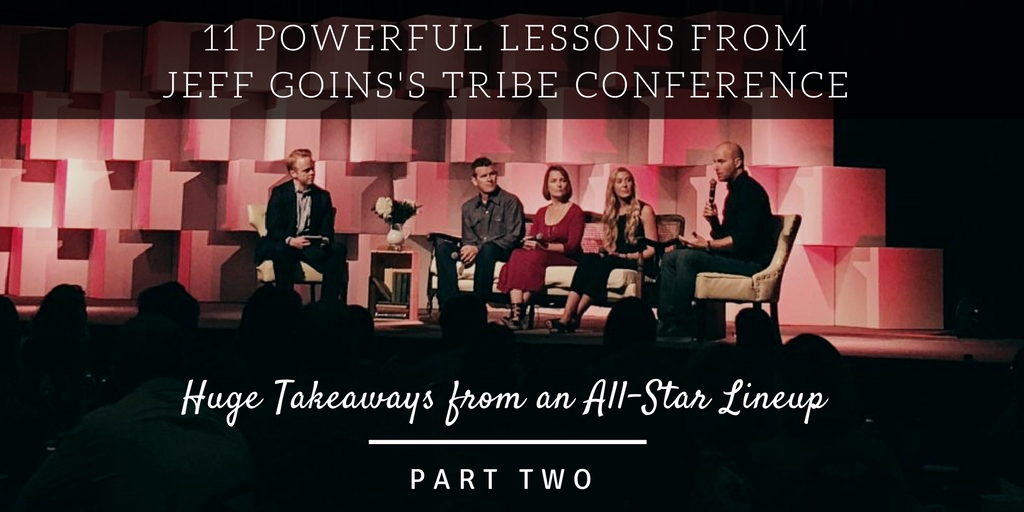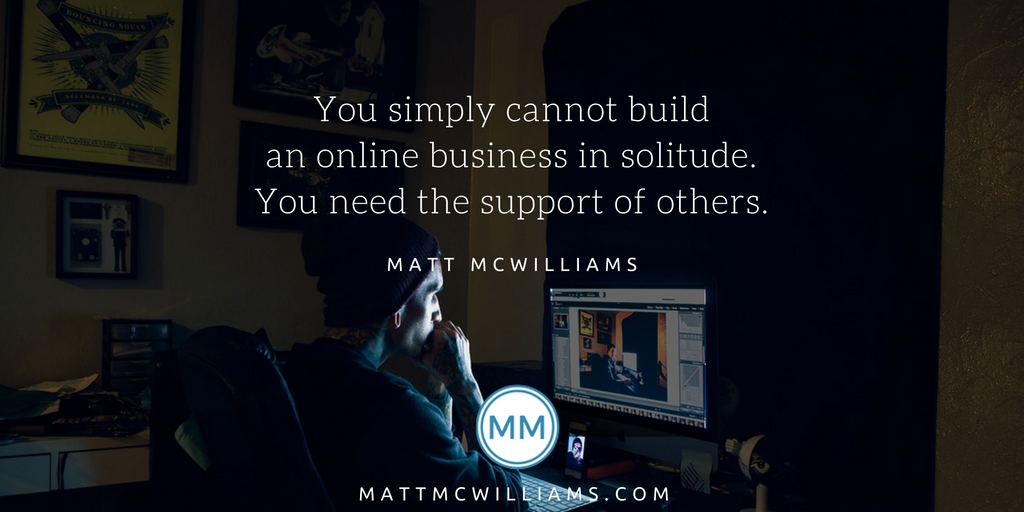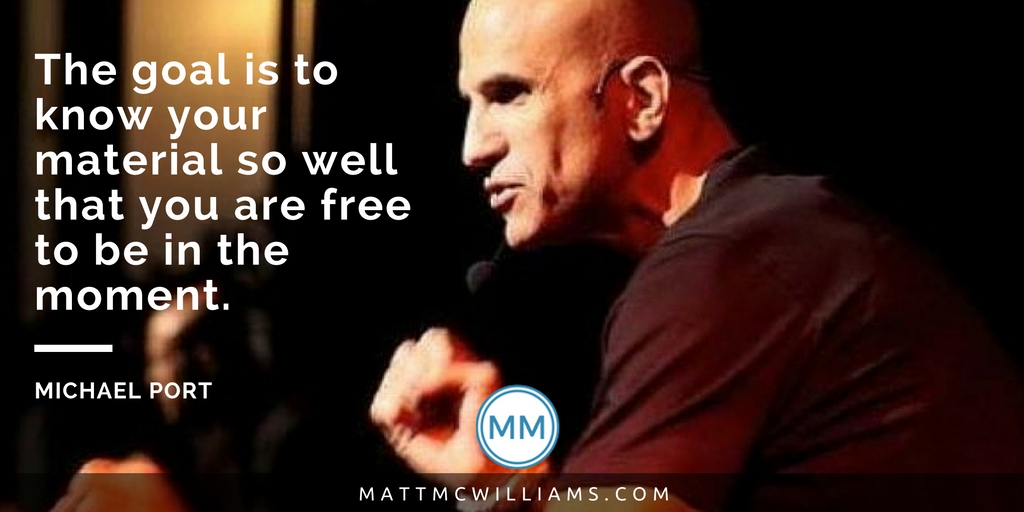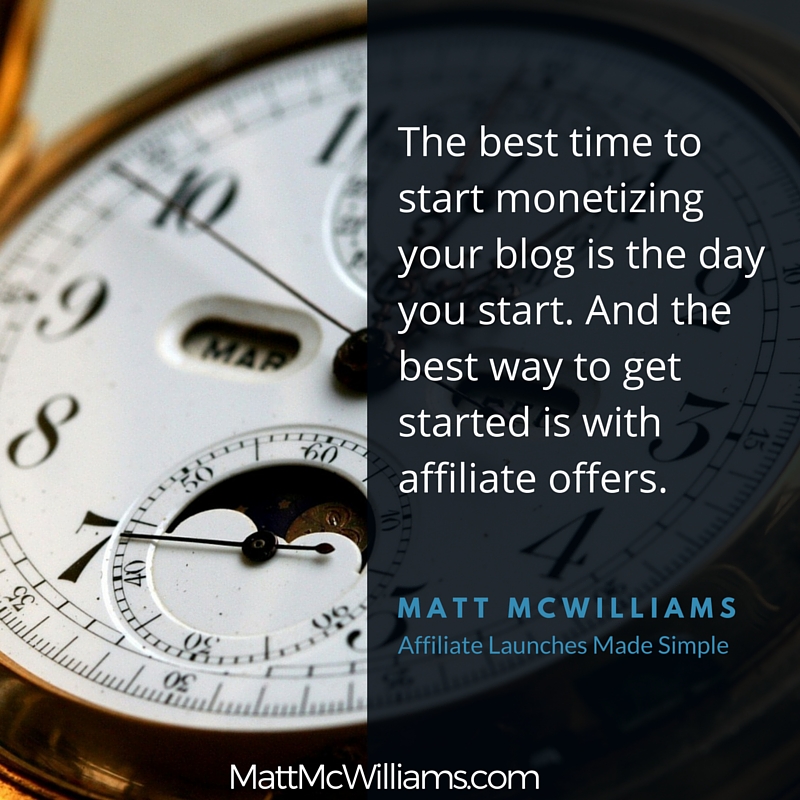Building an online platform is hard work, like any business. But the good news is that there is a wealth of great information from people who’ve already done it. And one of the best places to learn is at conferences, such as Jeff Goins’ Tribe Conference, which I attended recently. Here are some of my key takeaways.

This is part two of my 11 lessons from Tribe Conference. Read part one here.
Yesterday, I shared the first six lessons from Tribe Conference.
- The Power of Meeting In-Person.
- The Power of Showing Up.
- The Power of Greatness
- The Power of Connection
- The Power of Belief
- The Power of Teaching
If you missed that post, make sure to check it out here.
Here are lessons 7-11 from Tribe Conference.
7. The Power of a Relationships
Jeff held a great panel discussion on relationship-building (AKA networking, but I’m not a huge fan of that word) with Grant Baldwin, Dave Delaney, McKel Hill and Pamela Wilson.
The panel reminded me of something I’ve preached for years:

I’ll be posting more about relationship-building in the next few months, but for now remember these five keys:
- Be genuine. It’s OK to be a bit of a fan boy or girl with people you admire. Most of us actually secretly enjoy that. We especially like it when you try something we suggest and it works. Share that!
- Be yourself. Wouldn’t you rather surround yourself with people who get you, like you, and also want to be around you?
- Be consistent. Every day make it a point to reach out to one new person and follow-up with three people you already know.
- Be generous. Serve others first and it will come back around.
- Be realistic. Focus on building relationships with people who are one or two steps ahead of you, not five or ten.
8. The Power of Public Speaking
When Michael Port took the stage, I honestly wasn’t all that excited.
Nothing against Michael, but I thought I knew pretty much everything about public speaking. I’ve done it for 15 years in various settings. I’ve spoken to small groups and small arenas. I’ve spoken to groups of friends and groups of high-profile influencers.
And I thought I knew what I was doing. Boy, was I wrong!
Here are 12 quick takeaways from Michael’s speech (they apply not only to public speaking but online videos, webinars, podcasts, etc. as well):
- Use a short bio. The long the bio, the less credibility you have. In other words, who has the longer bio…Michael Jordan (who needs no introduction) or you? Think more like Jordan.
- Own the room. All eyes are on you and that is a good thing.
- Don’t apologize for time you don’t have. If you have five minutes, deliver a five minute masterpiece.
- Get to the WHY quick. They audience should know right away WHY your topic is important. What does it mean to them?
- Mystery is good. The old adage of “Tell them what you’re going to tell them, then tell them, then tell them what you told them” is valid but not entirely true. Keep the audience guessing a little. It keeps them engaged.
- Embrace your eccentricity. We all have our own styles. Our own moves. Our own voice. Our own look. Don’t try to mimic or clone others.
- Connect the dots. Make sure all the ideas you share connect to the others. Ultimately, they should point back to one central theme or idea.
- Don’t go slow. If you talk fast, talk fast. Speed is never the problem. The problem is that we don’t PAUSE. Which brings us to the next point…
- Pause for effect. No matter how fast you talk, pauses are important. It’s in the pause that the audience CONSUMES what we say.
- Contrast for effect. When a speaker suddenly speaks softly or makes a sudden move, it captures our attention. Use contrasts and extremes for effect. Change your pitch, your movement, your location on stage, your slide colors (if you use them).
- Stillness is powerful. Yes, you want to move on stage (naturally of course), but stillness can be incredibly powerful.
- Rehearsal is freedom. I used to think that rehearsing too much (or at all) would make a robot, but the reverse is true. Rehearsal allows you to know the material so well that you don’t have to sound scripted.
If you ever have the chance to see Michael speak in person, do it!

9. The Power of Pain
From Ray Edwards, I was reminded that pain (and the avoidance of pain) is excellent motivator.
Think about a small child who touches a hot stove. The pain he experiences is an excellent motivator to never do that again.
Chest pains are a great motivator to get someone to the doctor. Being out of breath after walking a flight of stairs is a great motivator to exercise.
Ray said something we’ve all heard before in online marketing: We must know our audience’s pain point(s).
Duh.
But Ray took it a step further. We must know our audience’s pain better than they know it themselves. In other words, the external problem is not the problem. It’s the internal interpretation of the problem that is the real problem.
We must know our audience’s pain better than they know it themselves.
The problem is not that someone is obese. The problem is that they are afraid they won’t live to the see their grandchildren.
The problem is not that they can’t find the time to write. The problem is that they are afraid they will be stuck in the same dead-end job ten years from now.
The problem is not that they don’t know how to set goals. The problem is that they are drifting through life with no direction. Life has become a monotonous, meaningless affair.
When you address the pain points in your audience’s lives, you must address the underlying, internal pain, not the obvious, external one.
Make the Consequences Clear
Once you’ve identified the real problem and the real pain, you must amplify the consequences.
For instance, Ray got me to realize the real problem behind not having affiliates. The issue is not that their online business won’t grow as fast. The real issue is that they’ll lose time with their families. Not having a powerful sales force of affiliates means more work for the business owner, more stress, less impact and less influence.
What does life look like for that person? It looks messy, stressful, isolated, and deadly. Yes, deadly. One of two things will happen…the business owner will burn out or die trying to scale his business.
That is the power of making the consequences clear.
10. The Power of Going Pro
Most people building an online business are doing it as a hobby.
No, really. Odds are you are doing it as a hobby.
You may use words like:
- Side hustle
- Side gig
- Part-time business
- Second job
- Side project
Pretty much every description involves something done on the side, in the margins, here and there, or in your dreams.
In other words, it’s not your first priority. It’s not something you dedicate yourself to. It’s not something you are monetizing.
You work on it when you can. You make time for it here and there. It’s a fantasy. It’s not a business.
But Shawn Coyne and Tim Grahl reminded me of the power of going pro. And going pro involves two major changes:
- The words you use.
- The schedule you keep.
To quote Shawn:
A professional is a professional in the eyes of himself. That is all that matters.
Do you refer to yourself as a professional or is it just a side gig, a passion project, or a part-time business?
Kids work part-time at McDonald’s. They aren’t professionals.
Change the words you use. Do like my friend Mark Sieverkropp did when he was working full-time at an insurance company. He referred to his blog, which was just getting started, as a his “first job.” The insurance job was his second job, his gig, his side hustle.
In his mind, he was a blogger. He owned an online business.
Does it Hurt?
It hurts a professional when he misses a day doing the work he KNOWS he should do. Does it hurt you when you miss a day of writing, creating, or monetizing? Does it cause a visceral pain deep in your soul when you go a day without gaining an email subscriber?
Or is it easy to get over as long as the bills are paid and you can live in relative comfort?
Do you have a content calendar and stick to it?
Or do you email your list here and there and miss the deadlines you set for yourself?
Real businesses have structure. Real businesses monetize. Real businesses hit their deadlines.
Are you running a real business or do you just have a hobby?

11. The Power of Getting Paid
If you believe that something can offer something of value to the world and transform others, why would you keep it to myself?
That is selfish.
Carrie Wilkerson reminded me of three very important lessons:
- It’s selfish to hoard knowledge. You have a responsibility, as Nathan Berry said, to teach what you know.
- You deserve to be paid for what you know.
- People don’t appreciate things as much when they are free. People must invest in themselves to truly appreciate what you teach.
Information is transformation. When you withhold information, you prevent transformation and Carrie makes it clear just how selfish that is.
Don’t hold back.
And when you do share what you know, you deserve to be paid for it.
No one in retail or the restaurant business apologizes for charging for their products.
I am reminded of the best business advice I ever received from two different people. They both said nearly identical things to me when I started my consulting business.
Take whatever you think you are worth and double or triple it.
The lesson there was not that I should overcharge but that we tend to undervalue what we are worth in the marketplace.
When I charge someone thousands of dollars to teach them what I know, they are not paying for two, five, or ten hours of my time. They are paying for 12+ years of experience. They are paying for the approximately 29,200 hours that I’ve invested in learning and honing my craft.
In other words, five hours with me saves them 5,000+ hours of learning by trial and error. It saves them hundreds of thousands of dollars in mistakes. It gets them to their goals in months instead of years.
And they get all that for as little as $2,000. Sounds like a bargain to me.
As Chris Ducker reminded us in the last presentation of the conference:
Charge what you are worth and DON’T apologize!
This was a powerful event full of even more lessons than I shared in these two posts. I hope you can join me at the next one.
What’s the best lesson you’ve learned from a live event?